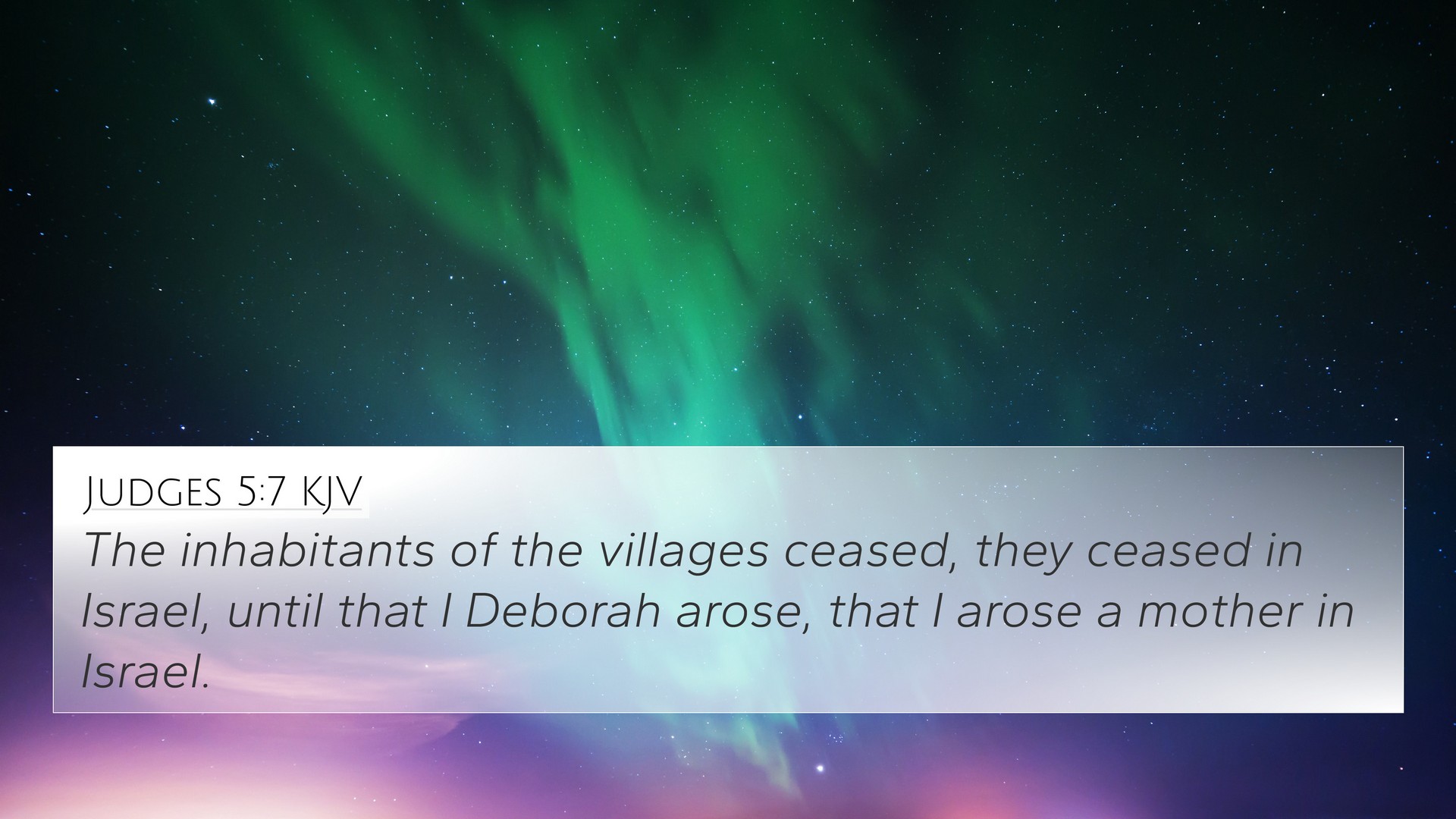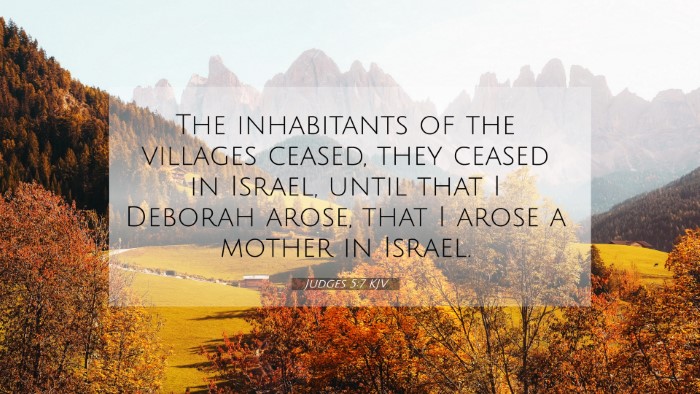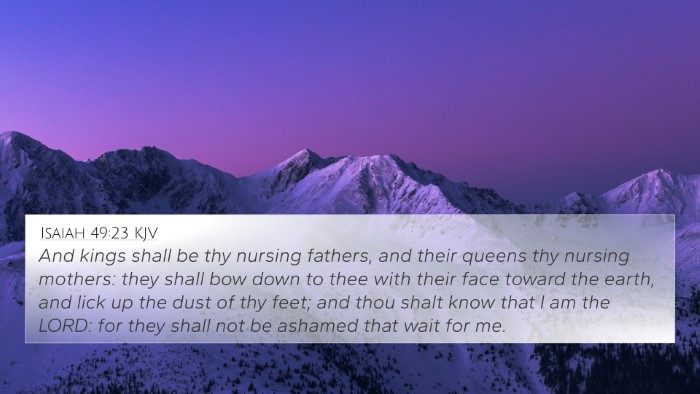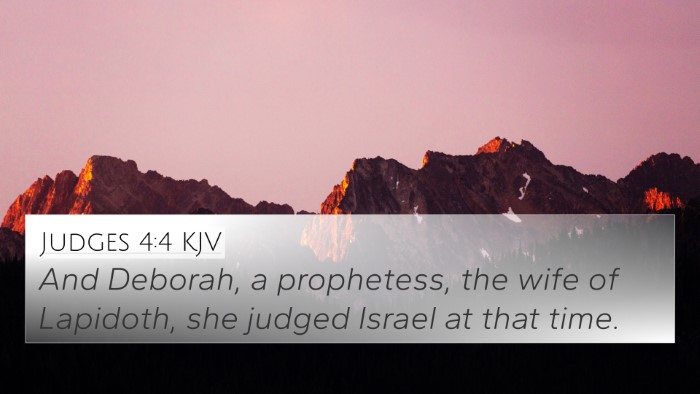Understanding Judges 5:7
Judges 5:7 states: "The inhabitants of the villages ceased, they ceased in Israel, until that I Deborah arose, that I arose a mother in Israel." This verse encapsulates a pivotal moment in Israel's history during a time of oppression and chaos. Below is a comprehensive analysis of the verse's meaning, combined from various public domain commentaries.
Contextual Background
This verse is part of the Song of Deborah, a poetic account celebrating a significant military victory led by the prophetess Deborah and Barak over the Canaanite oppression. This period in Israel’s history was marked by disarray and a lack of leadership, highlighting the importance of Deborah's emergence.
Key Insights from Commentaries
-
Matthew Henry:
Henry emphasizes the desolation experienced by the Israelites during this time, stating how communities turned stagnant in fear and oppression. The "villages ceased" indicates a withdrawal from social and communal life as individuals focused on mere survival. Deborah’s rise symbolizes hope and renewal, portraying her as a maternal figure leading Israel from despair.
-
Albert Barnes:
Barnes points out the significant transformation caused by Deborah's leadership. Her emergence as a "mother in Israel" illustrates the nurturing role of leaders and how spiritual and moral guidance can restore a nation. This reflective role suggests a fatherly and motherly balance in leadership that is essential for communal restoration.
-
Adam Clarke:
Clarke expounds on the idea of the villagers ceasing to function due to insecurity. His analysis highlights how Deborah’s leadership galvanizes the people, reinvigorating their spirits and leading them back to a path of strength and unity. Clarke also interprets the “mother” metaphor further, suggesting that Deborah's leadership instilled a sense of family and belonging in the struggling nation.
Thematic Connections
This verse not only emphasizes the urgent need for divine leadership but also reflects on communal strength in the face of adversity. Below are thematic connections and cross-references found in the Bible that resonate with the message of Judges 5:7:
- Isaiah 3:12: Describes a situation where children oppress the people, similar to how Deborah arises to address Israel's plight.
- Proverbs 31:10-31: A description of a virtuous woman; parallels can be drawn between the ideal woman here and Deborah’s strong leadership.
- 2 Samuel 20:19: Highlights the importance of a wise woman in a chaotic situation, akin to Deborah's role.
- Judges 4:4-5: Sets the stage for Deborah’s rise, showing her initial position as a judge and prophetess in Israel.
- Psalm 68:11: States, “The Lord gave the word: great was the company of those that published it,” reminding us of the importance of leadership in disseminating hope.
- 1 Corinthians 11:3: Discusses roles in society, drawing comparisons about leadership and authority that Deborah exemplifies.
- Luke 1:46-55: Mary’s song of praise reflects a similar theme of divine intervention and the role of women in God’s plan, mirroring Deborah’s leadership.
Lessons for Today
The significance of Deborah's story lies not only in the historical context but also in the lessons it provides for contemporary readers. Deborah emerges as a symbol of strength, resilience, and maternal leadership during times of trial. Her ability to inspire and guide her people demonstrates the essential quality of leadership that transcends gender, encouraging individuals to seek guidance and act in times of uncertainty.
Furthermore, those studying the connections between Bible verses can recognize the theme of restoration through leadership seen in both the Old and New Testaments, encouraging a deeper understanding of God’s providential care for His people.
Cross-Referencing Methodologies
Understanding Bible verses such as Judges 5:7 can be significantly enhanced through cross-referencing. Utilizing tools such as a Bible concordance or a Bible cross-reference guide can aid in discovering thematic Bible verse connections that bolster one’s study. Here are some methods and resources for effective cross-referencing:
- Utilize a Bible concordance to find keywords related to your verse.
- Employ a Bible cross-reference guide to identify verses that support similar themes.
- Explore different Cross-referencing Bible study methods to uncover interrelated passages.
- Refer to comprehensive Bible reference resources to facilitate deeper studies.
Conclusion
Judges 5:7 encapsulates the need for divinely inspired leadership in times of distress. The analysis and cross-referencing of this verse with others enrich our understanding and highlight the timeless nature of these Biblical teachings. Through the roles of figures such as Deborah, we learn about resilience, community, and the hope that can arise from spiritual leadership.







